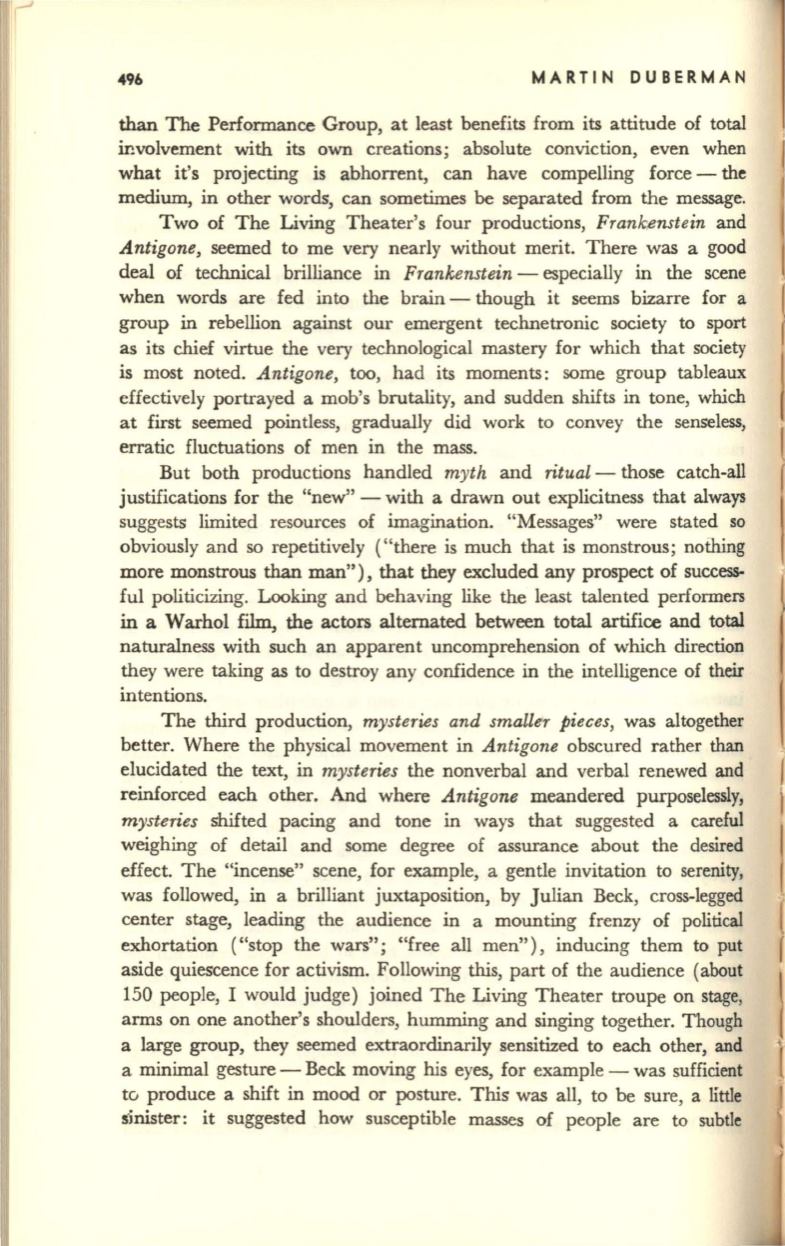
496
MARTIN DUBERMAN
than
The Performance Group, at least benefits from its attitude of total
involvement with its own creations; absolute conviction, even when
what it's projecting is abhorrent, can have compelling force - the
medium, in other words, can sometimes be separated from the message.
Two of The Living Theater's four productions,
Franlwmstein
and
Antigone,
seemed to me very nearly without merit. There was a good
deal of technical brilliance in
Frankenstein
-
especially in the scene
when words are fed into the brain - though it seems bizarre for a
group in rebellion against our emergent technetronic society to sport
as its
chief
virtue the very technological mastery for which that society
is most noted.
Antigone,
too, had its moments: some group tableaux
effectively portrayed a mob's brutality, and sudden shifts in tone, which
at first seemed pointless, gradually did work to convey the senseless,
erratic fluctuations of men in the mass.
But both productions handled
myth
and
ritual-
those catch-all
justifications for the "new" - with a drawn out explicitness that always
suggests limited resources of imagination. "Messages" were stated so
obviously and so repetitively ("there is much that is monstrous; nothing
more monstrous
than
man"), that they excluded any prospect of success–
ful politicizing. Looking and behaving like the least talented performers
in
a Warhol film, the actors alternated between total artifice and total
naturalness with such an apparent uncomprehension of which direction
they were taking as to destroy any confidence in the intelligence of their
intentions.
The third production,
mysteries and smaller pieces,
was altogether
better. Where the physical movement in
Antigone
obscured rather
than
elucidated the text, in
mysteries
the nonverbal and verbal renewed and
reinforced each other. And where
Antigone
meandered purposelessly,
mysteries
shifted pacing and tone in ways that suggested a careful
weighing of detail and some degree of assurance about the desired
effect. The "incense" scene, for example, a gentle invitation to serenity,
was followed, in a brilliant juxtaposition, by Julian Beck, cross-legged
center stage, leading the audience in a mounting frenzy of political
exhortation ("stop the wars"; "free all men"), inducing them to put
aside quiescence for activism. Following this, part of the audience (about
150 people, I would judge) joined The Living Theater troupe on stage,
arms on one another's shoulders, humming and singing together. Though
a large group, they seemed extraordinarily sensitized to each other, and
a minimal gesture - Beck moving his eyes, for example - was sufficient
to produce a shift in mood or posture. This was all, to be sure, a little
sinister: it suggested how susceptible masses of people are to subtle


